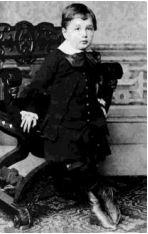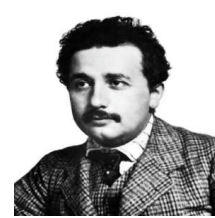
CHILDHOOD
- Albert Einstein was born in Ulm, in the Kingdom of Württemberg in the German Empire, on 14 March 1879.
- His parents were Hermann Einstein, a salesman and engineer, and Pauline Koch. In 1880, the family moved to Munich, where Einstein's father and his uncle Jakob founded Elektrotechnische Fabrik J. Einstein & Cie, a company that manufactured electrical equipment based on direct current.
- Albert attended a Catholic elementary school in Munich, from the age of 5, for three years. At the age of 8, he was transferred to the Luitpold Gymnasium where he received advanced primary and secondary school education until he left the German Empire seven years later.

CHILD GENIUS
- In 1894, Hermann and Jakob's company faced loss which forced the sale of the Munich factory. In search of business, the Einstein family moved to Italy, first to Milan and a few months later to Pavia.
- When the family moved to Pavia, Einstein, then 15, stayed in Munich to finish his studies at the Luitpold Gymnasium. His father intended for him to pursue electrical engineering, but Einstein clashed with authorities and resented the school's regimen and teaching method.
- At the end of December 1894, he travelled to Italy to join his family in Pavia, convincing the school to let him go by using a doctor's note.
- Einstein always excelled at maths and physics from a young age, reaching a mathematical level years ahead of his peers. The twelve year old Einstein taught himself algebra and Euclidean geometry over a single summer.
- Einstein also independently discovered his own original proof of the Pythagorean theorem at age 12
CHILD GENIUS
- His passion for geometry and algebra led the twelve year old to become convinced that nature could be understood as a "mathematical structure".
- Einstein started teaching himself calculus at 12, and as a 14 year old he says he had "mastered integral and differential calculus".At age 13, Kant became his favorite philosopher.
- In 1895, at the age of 16, Einstein took the entrance examinations for the Swiss Federal Polytechnic in Zürich . He failed to reach the required standard in the general part of the examination, but obtained exceptional grades in physics and mathematics.
- On the advice of the principal of the Polytechnic, he attended the Argovian cantonal school in Aarau, Switzerland, in 1895 and 1896 to complete his secondary schooling.
- While lodging with the family of professor Jost Winteler, he fell in love with Winteler's daughter, Marie.
BEGINNING
- Albert's sister Maja later married Winteler's son Paul. In January 1896, with his father's approval, In September 1896, he passed the Swiss Matura with mostly good grades, including a top grade of 6 in physics and mathematical subjects.
- At 17, he enrolled in the four-year mathematics and physics teaching diploma program at the Zürich Polytechnic.
- EINSTEIN'S FUTURE WIFE, A 20-YEAR OLD SERBIAN WOMAN MILEVA MARIĆ, also enrolled at the Polytechnic that year. She was the only woman among the six students in the mathematics and physics sectio of the teaching diploma course.
- Over the next few years, Einstein and Marić's frendship developed into romance, and they read books together on extra-curricular physics in which Einstein was taking an increasing interest. In 1900, Einstein passed the exams in Maths and Physics and was awarded the Federal Polytechnic teaching diploma

MILEVA MARIC
- Marić returned to Switzerland without the child, whose real name and fate are unknown. The contents of Einstein's letter in September 1903 suggest that the girl was either given up for adoption or died of scarlet fever in infancy.
- Einstein and Marić married in January 1903. In May 1904, their son Hans Albert Einstein was born in Bern, Switzerland. Their son Eduard was born in Zürich in July 1910.
- The couple moved to Berlin in April 1914, but Marić returned to Zürich with their sons after learning that Einstein's chief romantic attraction was his first and second cousin Elsa.
- They divorced on 14 February 1919, having lived apart for five years.
MILEVA MARIC
- Eduard had a breakdown at about age 20 and was diagnosed with schizophrenia.His mother cared for him and he was also committed to asylums for several periods, finally being committed permanently after her death.
- In letters revealed in 2015, Einstein wrote to his early love Marie Winteler about his marriage and his strong feelings for her.
- Einstein married Elsa Löwenthal in 1919, after having a relationship with her since 1912.She was a first cousin maternally and a second cousin paternally. They emigrated to the United States in 1933, She died in December 1936
STRUGGLE YEARS
- After graduating in 1900, Einstein spent almost two frustrating years searching for a teaching post. He acquired Swiss citizenship in February 1901,but was not conscripted for medical reasons.
- Finally secured a job in Bern at the Federal Office for Intellectual Property, the patent office,as a clerk.
- In 1903, his position at the Swiss Patent Office became permanent, With a few friends he had met in Bern, Einstein started a small discussion group in 1902, self-mockingly named "The Olympia Academy", which met regularly to discuss science and philosophy.
ALBERT EINSTEIN PART – 2
SCIENTIFIC PAPERS
- On 30 April 1905, Einstein completed his thesis, with Alfred Kleiner, Professor of Experimental Physics. As a result, Einstein was awarded a PhD by the University of Zürich, with his dissertation "A New Determination of Molecular Dimensions".
- In that same year, which has been called Einstein's miracle year, he published four groundbreaking papers, on the photoelectric effect, Brownian motion, special relativity, and the equivalence of mass and energy, which were to bring him to the notice of the academic world, at the age of 26.
- By 1908, he was recognized as a leading scientist and was appointed lecturer at the University of Bern. Einstein became a full professor at the German Charles-Ferdinand University in Prague in April 1911, accepting Austrian citizenship in the Austro-Hungarian Empire to do so.
CAREER
- On 3 July 1913, he was voted for membership in the Prussian Academy of Sciences in Berlin. Max Planck and Walther Nernst visited him the next week in Zurich to persuade him to join the academy, additionally offering him the post of director at the Kaiser Wilhelm Institute for Physics.
- He was officially elected to the academy on 24 July, and he accepted to move to the German Empire the next year. His decision to move to Berlin was also influenced by the prospect of living near his cousin Elsa.
- He joined the academy and thus the Berlin University on 1 April 1914. As World War I broke out that year, the plan for Kaiser Wilhelm Institute for Physics was aborted. The institute was established on 1 October 1917, with Einstein as its director. In 1916, Einstein was elected president of the German Physical Society (1916–1918).
CAREER
- Based on calculations Einstein made in 1911, about his new theory of general relativity, light from another star should be bent by the Sun's gravity. In 1919, that prediction was confirmed by Sir Arthur Eddington during the solar eclipse of 29 May 1919.
- Those observations were published in the international media, making Einstein world famous. On 7 November 1919, the leading British newspaper The Times printed a banner headline that read: "Revolution in Science – New Theory of the Universe – Newtonian Ideas Overthrown".
- In 1922, he was awarded the 1921 Nobel Prize in Physics "for his services to Theoretical Physics, and especially for his discovery of the law of the photoelectric effect".
USA
- In In December 1930, Einstein visited America for the second time, originally intended as a two-month working visit as a research fellow at the California Institute of Technology.
- After the national attention he received during his first trip to the US, he and his arrangers aimed to protect his privacy. Although swamped with telegrams and invitations to receive awards or speak publicly, he declined them all.
- After arriving in New York City, Einstein was taken to various places. n February 1933 while on a visit to the United States, Einstein knew he could not return to Germany with the rise to power of the Nazis under Germany's new chancellor, Adolf Hitler
- Upon landing in Antwerp on 28 March, he immediately went to the German consulate and surrendered his passport, formally renouncing his German citizenship
REFUGEE
- In April 1933, Einstein discovered that the new German government had passed laws barring Jews from holding any official positions, including teaching at universities.
- A month later, Einstein's works were among those targeted by the German Student Union in the Nazi book burnings, with Nazi propaganda minister Joseph Goebbels proclaiming, "Jewish intellectualism is dead."
- Einstein was now without a permanent home, unsure where he would live and work, and equally worried about the fate of countless other scientists still in Germany.
- In October 1933 Einstein returned to the US and took up a position at the Institute for Advanced Study.In1935 he arrived at the decision to remain permanently in the United States and apply for citizenship.
WORLD WAR 2
- In 1939, a group of Hungarian scientists that included physicist attempted to alert Washington to ongoing Nazi atomic bomb research.
- Hitler would be more than willing to resort to such a weapon.In July 1939, a few months before the beginning of World War II in Europe, Szilárd and Wigner visited Einstein to explain the possibility of atomic bombs, which Einstein, a pacifist, said he had never considered.
- He was asked to lend his support by writing a letter, with Szilárd, to President Roosevelt, recommending the US pay attention and engage in its own nuclear weapons research.
- The letter is believed to be "arguably the key stimulus for the U.S. adoption of serious investigations into nuclear weapons. For Einstein, "war was a disease and he called for resistance to war."
DEATH
- On 17 April 1955, Einstein experienced internal bleeding caused by the rupture of an abdominal aortic aneurysm, Einstein refused surgery, saying, "I want to go when I want. It is tasteless to prolong life artificially. I have done my share; it is time to go. I will do it elegantly."
- He died in Princeton Hospital early the next morning at the age of 76, having continued to work until near the end.
- During the autopsy, the pathologist of Princeton Hospital, Thomas Stoltz Harvey, removed Einstein's brain for preservation without the permission of his family, in the hope that the neuroscience of the future would be able to discover what made Einstein so intelligent.
SCIENTIFIC CAREER
- Throughout his life, Einstein published hundreds of books and articles. He published more than 300 scientific papers and 150 non-scientific ones. instein's intellectual achievements and originality have made the word "Einstein" synonymous with "genius."
- In his paper on mass–energy equivalence, Einstein produced E = mc2 from his special relativity equations.
- Einstein received numerous awards and honors and in 1922 he was awarded the 1921 Nobel Prize in Physics "for his services to Theoretical Physics, and especially for his discovery of the law of the photoelectric effect".
- None of the nominations in 1921 met the criteria set by Alfred Nobel, so the 1921 prize was carried forward and awarded to Einstein in 1922.
Biography Free PDF

Posted by: nigelnigelesteene0271169.blogspot.com
Source: https://blog.studyiq.com/albert-einstein-free-pdf-download/

Post a Comment